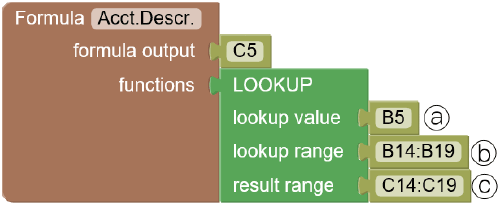Authors
Bas Jansen & Felienne Hermans
Abstract
Spreadsheets are frequently used in industry to support critical business decisions. Unfortunately, they also suffer from error-proneness, which sometimes results in costly consequences.
Experiments in the field of program education have shown that programmers tend to make fewer errors and can better focus on the logic of a program if they use a block-based language instead of a textual one. We hypothesize that a block-based formula editor could support spreadsheet users in a similar way.
Therefore, we develop XLBlocks and conduct a think-aloud study with 13 experienced spreadsheet users from industry. Participants are asked to create and edit several formulas, using our block-based language. We then ask them to evaluate this editor using the Cognitive Dimensions of Notations framework.
We found that for all dimensions the block-based formula editor received a better evaluation than the default text-based formula editor.
Sample

To do a lookup, the user simply specifies:
- (a) the value they are looking for.
- (b) the range that contains the possible lookup values.
- (c) the range that contains the matching results.
XLBlocks translates this into the following formula: =INDEX(C14:C19,MATCH(B5,B14:B19,0)).
Using the LOOKUP block in XLBlocks give users the flexibility of the INDEX and MATCH combination without the complexity.
Publication
2019, IEEE Symposium on Visual Languages and Human-Centric Computing (VL/HCC), October
Full article
XLBlocks: A block-based formula editor for spreadsheet formulas
